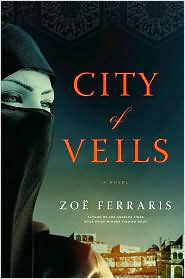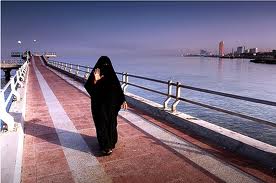“They hate women. They hate them and they fear them….There’s an old Islamic saying…that heaven is crowded with beggars, and hell is overflowing with women.”
If you have ever wond ered what it would really be like to be a woman living in Saudi Arabia, then this novel may answer most of your questions. Confined to a black burqa which covers every inch of skin except for her eyes whenever she leaves her house, even when it is over a hundred twenty degrees outside, an unmarried woman must never be alone with a man. She must always be accompanied by a male member of her family, even, as occurs in one scene here, if the member of the family is only seven years old. Each week a list of new fatwahs is released—prohibitions regarding even the smallest aspects of behavior (including one against the reading of fiction)—and the “religious police” are empowered to arrest and detain anyone, even foreigners, who violates these rules. Women may not drive cars in Saudi Arabia, and they are discouraged from working outside the house. A conflict of values arises when women need to buy underwear – from male shopkeepers. Sometimes their husbands must purchase it for them; at other times, a shop will hire a woman specifically to wait on other women.
ered what it would really be like to be a woman living in Saudi Arabia, then this novel may answer most of your questions. Confined to a black burqa which covers every inch of skin except for her eyes whenever she leaves her house, even when it is over a hundred twenty degrees outside, an unmarried woman must never be alone with a man. She must always be accompanied by a male member of her family, even, as occurs in one scene here, if the member of the family is only seven years old. Each week a list of new fatwahs is released—prohibitions regarding even the smallest aspects of behavior (including one against the reading of fiction)—and the “religious police” are empowered to arrest and detain anyone, even foreigners, who violates these rules. Women may not drive cars in Saudi Arabia, and they are discouraged from working outside the house. A conflict of values arises when women need to buy underwear – from male shopkeepers. Sometimes their husbands must purchase it for them; at other times, a shop will hire a woman specifically to wait on other women.

Women who do work outside the home often work for the media or for the police, but these women are nearly always married (because single women cannot interact with men), and whoever hires them must provide separate offices for them. Leila Nawar, whose grotesquely tortured body is found washed up along the Corniche in Jeddah as the novel opens, works as a videographer for a television station, but she is also secretly working on her own project about women and their sometimes miserable lives in Jeddah. Because she has made many enemies among those who do not wish to appear in her compromising videos, she keeps most of her film at home, storing it on her computer or on discs. When her body is actually identified, a rare event for women victims who have no fingerprints available and who wear veils outside the home, the police are anxious to study her recent films for clues to her death.
Detective Inspector Osama Ibrahim of the Jeddah Police/Security Department, needs women officers to help him by interviewing female witnesses or victims without their male escorts present. He depends on Faiza, and later Katya, within his department, to bridge the communication gap with the women who need help, women like Miriam Walker, an American whose husband has vanished. The US consulate has been unable to find him.
As the death  of Leila Nawar and the disappearance of Eric Walker, the American, are investigated, several other plot lines also unfold, involving a large number of overlapping characters who are dealing with other kinds issues. Two unusual love stories provide personal interest and fascinating perceptions of Saudi religious culture. In one, the husband discovers that his adored wife has been using birth control pills, contrary to his religion, and he is devastated at what he regards as her betrayal. In the other, a young couple, very attracted to each other, separate for months, maybe permanently, because the man is more religious than the woman, and he fears that loving her will make him less worthy in the eyes of Allah.
of Leila Nawar and the disappearance of Eric Walker, the American, are investigated, several other plot lines also unfold, involving a large number of overlapping characters who are dealing with other kinds issues. Two unusual love stories provide personal interest and fascinating perceptions of Saudi religious culture. In one, the husband discovers that his adored wife has been using birth control pills, contrary to his religion, and he is devastated at what he regards as her betrayal. In the other, a young couple, very attracted to each other, separate for months, maybe permanently, because the man is more religious than the woman, and he fears that loving her will make him less worthy in the eyes of Allah.
Author Zoe Ferraris writes this compelling and insightful novel from experience. Having lived in Saudi Arabia for several years with her then-husband, a Saudi-Palestinian-Bedouin, she has packed her novel with information about the Saudis’ unique culture, one which has become more strict over the past ten years. We learn, for example, that organized sports for young girls are now banned, though they had been popular. At the age of eleven or twelve, the girls now disappear from view, becoming part of the women’s culture and wearing full burqas from then on. Even small details are revelatory—one woman is excused from “im modesty” in her conversation because, having reached the advanced age of thirty-seven, she has “passed into the sanctuary of perceived sexlessness.” One cleric even approves “summer holiday marriages” for men, marriages of convenience contracted for short periods of time—because he does not regard women as people.
modesty” in her conversation because, having reached the advanced age of thirty-seven, she has “passed into the sanctuary of perceived sexlessness.” One cleric even approves “summer holiday marriages” for men, marriages of convenience contracted for short periods of time—because he does not regard women as people.
As the daily lives of the women here become increasingly claustrophobic and frustrating, the limitations and, more importantly, the seeming impossibility of any change becomes increasingly obvious and increasingly difficult for the western reader to understand. The death of Leila reveals the hidden underside of Jeddah society, while the disappearance of Eric Walker reveals the attitudes toward foreigners (regarded as infidels under religious law) and the inabilities of the US government to solve his disappearance within the Saudi system. Her prose is efficient, and she keeps the story moving, in part through her strong reliance on coincidence to connect characters and resolve plot issues. Characters just happen to know other characters—or find their lives unexpectedly overlapping with them in surprising ways that bear no resemblance to reality. A number of subplots and many new characters, some of them extraneous, seem to have been included to allow the author to show more aspects of Saudi life, rather than because they contribute to solving the mysteries at the heart of the novel. City of Veils is compelling, intricate, exciting, and sometimes violent – and readers of this novel will never again wonder why these women do not rebel.
Photos, in order: The author’s photo is from www.kqed.org
The photo of the Corniche in Jeddah, where Leila’s body is discovered, is from http://www.anneofcarversville.com
The photo of Jeddah women (with cell phone) is from: www.hyscience.com
Note: For novel written by a Saudi about the society, see Munira’s Bottle by Yousef al-Mohaimeed, reviewed here.
